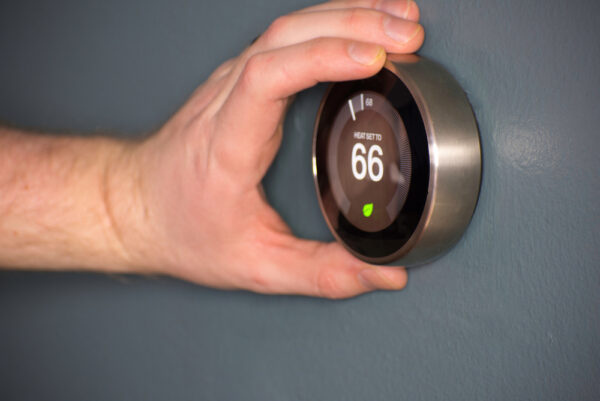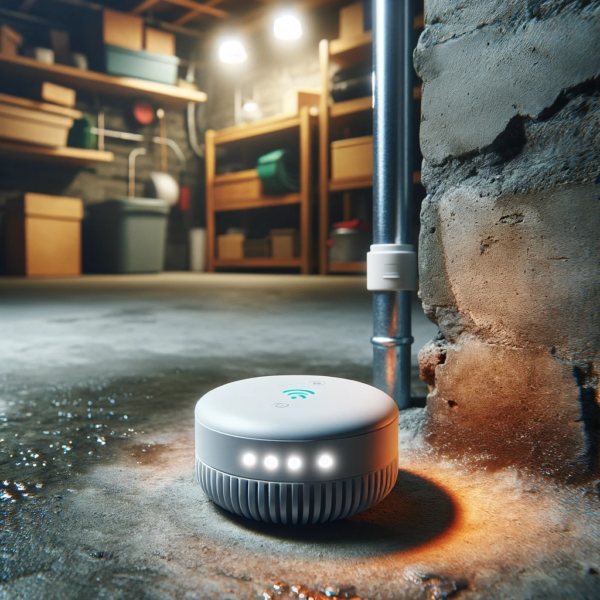Many modern renters are attracted to the various bells and whistles that fall under the umbrella of “smart home technology,” and the property management industry has risen to meet that demand. But while smart home solutions can certainly attract a higher caliber of tenant and allow landlords to raise rents, they can also help make rental properties (both single-family homes and apartments) more energy efficient, lowering utility bills and prolonging the life of HVAC units, which are notoriously difficult to repair or replace. Outfitting a property with such technology can quickly get expensive, so we’ve gathered a handful of affordable smart home ideas for rental properties. We’ll even touch on noise monitoring devices for you property managers specializing in short-term rentals via Airbnb or Vrbo.
Smart Thermostats
It’s less alluring than amenities such as parking or laundry, but prospective tenants will certainly be impressed when they tour a home or apartment equipped with a smart thermostat instead of a traditional mechanical or digital thermostat, which offer little more than the ability to schedule a few custom time slots for heating and cooling.
Because they seamlessly optimize temperature settings, smart thermostats are one of the best ways for landlords to protect costly HVAC systems, which can undergo considerable wear and tear if simply operated manually by tenants on the go. If you’ve ever had to repair an HVAC’s system failed motor or compressor, you know from experience that parts and labor costs can skyrocket quickly. The less often an HVAC system is exerting itself to heat or cool your property, the longer its lifespan, and the smaller the hit on your wallet.

Higher-end thermostats like ecobee’s Smart Thermostat Premium will give your tenants the ability to monitor indoor air quality, and they can even issue reminders to change air filters, which also helps to extend the life of HVAC systems. And while budget options such as the Wyze Thermostat and Amazon Smart Thermostat may not be the best, they are affordable smart home solutions that still help to protect rental properties, and prospective renters will count such a device as another reason to consider signing a lease.
It’s also worth noting that integrating smart home solutions such as thermostats (and the rest of the things we’ll cover in this article) into your property management business is an effective way to not only entice new renters—it also keeps them around. If tenants can stay warm in the winter and cool in the summer without fussing over inefficient technology, then you’ve managed to provide an important creature comfort that may entice them to renew their leases year after year, thereby increasing retention and saving money on turnover.
Smart Smoke Detectors
It varies from state to state, but chances are good that if you own rental properties, you are required to install smoke detectors and/or carbon monoxide detectors on the premises. You can get by with cheap detectors that simply ring out when smoke or carbon monoxide are detected, but for a few extra dollars you can equip your rental homes or apartments with smart detectors that will make your properties even safer, providing you with yet another selling point for potential renters, and protecting your prized investment.
Chief among the reasons to consider providing your properties with smart smoke detectors is that your tenants will be safer for it. Smart smoke detectors don’t just blare a repetitive tone when smoke or carbon monoxide are detected in the property—they are additionally capable of sending voice and smartphone alerts, and many of them can interface with other smart home devices that your renters may already have on their own. The more ways a tenant can be alerted of danger, the less likely it is that they (or your property) come to harm.
Smart smoke detectors are also much more efficient than the typical circular plastic alarms. They tend to remain functional for longer periods of time, and their battery lives are typically more robust than those of traditional alarms.
There are a number of routes you can take if you do decide to outfit your properties with smart smoke detectors. Google’s Nest Protect is a popular choice, and not too big a hit on the wallet at just $119. Kidde has a $129 smart smoke and carbon monoxide alarm that can also monitor indoor air quality, as well as a simpler and more affordable smoke alarm that is Wi-Fi-ready and able to send mobile alerts to residents.
Smart Locks
You probably have some sort of provision in your lease agreements that allows you to charge tenants every time they lock themselves out of their property, and you or an employee or maintenance person has to swing by to let them in. But that’s still time wasted, and often a bit of a hassle. You can avoid this altogether by equipping your properties with smart locks.
With smart locks, you won’t have to issue keys to all of your tenants, and you’ll be able to do away with maintaining and keeping track of all those keys. Instead, depending on the type of lock you go with, you can either issue your renters a passcode, or allow them to make their own (while still reserving control with a master passcode).

The beauty of this arrangement is that if you’ve scheduled a maintenance person or contractor to come by the property to fix or inspect something, neither you nor your tenant needs to meet them in person to let them in: just remotely unlock the property when they arrive, and remotely lock it back up when they leave. Since we provide maintenance with our contractor network, we know about keys and access information all too well.
And once a tenant has moved out, or in the event that they have violated their lease agreement and you’ve opted to evict them, you won’t need to collect their keys or change the locks. Instead, all you need to do is change the passcode.
A lot of smart locks on the market can cost you upwards of $300 per property, but there are some budget options out there too. Wyze’s Lock Bolt offers biometric Bluetooth-enabled entry at a reasonable price point of just $74, and the Bosma Aegis Smart Door Lock ($120) allows you to simply retrofit an existing deadbolt into a smart lock without actually having to change out the deadbolt itself—plus you can keep the key as an extra backup.
Noise Monitoring Devices
In this section, we’ll touch on a technology is more specifically tailored to property managers who specialize in short-term rentals. To hedge against potentially disastrous parties and college kid revelry, many managers who rent out properties via platforms such as Airbnb or Vrbo have begun to outfit their properties with noise monitoring devices.
If you’ve ever had to comb through the aftermath of a house party in one of your short-term properties, you know that it can be an expensive and time-consuming hassle, even if you’re able to bill the guilty guest for the cost of cleaning and repairs. The bigger problem is often the fact that you suddenly require a larger window of time to get the property ready for the next guest, which can force you to reschedule bookings and create a costly ripple effect across your scheduled appointments. Additionally, neighbors notice when a short-term rental is subjected to a chaotic house party, and this can potentially tarnish your property’s reputation in the neighborhood.
There are a number of noise monitoring devices that will do the trick, and Airbnb endorses three in particular that offer all the capabilities a manager needs to protect their properties: Minut, NoiseAware, and Roomonitor. By sending alerts to landlords and/or the guests themselves when excessive noise levels are detected, all three of these devices can help prevent parties before they even get started (note: the devices don’t actually violate guests’ privacy by recording audio; they simply monitor decibel levels). Additionally, NoiseAware cleverly tracks the number of wireless signals on a given property, Minut can monitor humidity and mold risk, and Roomonitor boasts a team of “Night Agents” that can be dispatched to the property and “act as defined on a previously agreed intervention protocol.” It’s a brave new world for managers of short-term rental properties.
Smart Water Detection Sensors
One final smart device that we are going to touch on is water detection sensors. Water is a property manager’s biggest fear because of the damage and headaches it can cause. These devices can significantly reduce the risk and cost associated with water damage, one of the most common and expensive insurance claims in rental properties. By promptly detecting leaks and moisture, these sensors can alert property managers or tenants to take immediate action, preventing extensive damage and costly repairs.

Smart water sensors work by detecting the presence of water or changes in humidity, sending instant alerts to a smartphone or central management system. This immediate notification allows for rapid response, potentially saving thousands of dollars in water damage restoration.
Several companies stand out in the market for their reliable and innovative water detection sensors:
- Honeywell Home: Known for its wide range of home automation products, Honeywell offers water leak and freeze detectors that are easy to install and integrate with other smart home devices.
- Fibaro: Fibaro’s Flood Sensor not only detects water but also monitors temperature changes and tampering. Its compact and modern design makes it an unobtrusive addition to any rental property.
- D-Link: Offering Wi-Fi water leak sensors that don’t require a hub, D-Link’s solution is straightforward and user-friendly, ideal for quick setup in multiple property locations.
By incorporating these smart water detection sensors, property managers can enhance the safety and appeal of their rental units, offering peace of mind to themselves and their tenants. This proactive approach to property management not only saves money in potential repairs but also positions a rental property as a modern, well-maintained, and technologically advanced choice for prospective renters.
Making Smart Rental Properties
Sure, a smart lock or a smart thermostat is an attractive feature that might catch the eye of today’s modern renter, but landlords can seriously elevate their property management business to the next level by offering a constellation of smart home solutions throughout their properties. The smart home technologies for rental properties we’ve outlined in this article can be easily and affordably integrated into single-family homes, apartments, and short-term rentals alike, and by employing them in tandem, you lend your properties a gleaming, new-age sheen that is highly attractive in today’s market (and we didn’t even cover other smart home solutions such as smart lighting, smart power meters, and smart irrigation controllers). By modernizing your property management business and making your rentals smarter, you make your tenants happier and more likely to renew their leases, increasing retention and decreasing turnover. Everybody wins.
Anything found written in this article was written solely for informational purposes. We advise that you receive professional advice if you plan to move forward with any of the information found. You agree that neither Lula or the author are liable for any damages that arise from the use of the information found within this article
